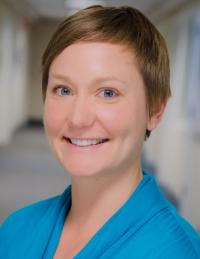Erin L. Van Blarigan, ScD

Erin L. Van Blarigan, ScD
Education
Biography
Dr. Van Blarigan earned her doctor of science in Epidemiology and Nutrition from the Harvard School of Public Health. Her doctoral dissertation was titled, “Diet and physical activity in relation to prostate cancer progression and survival,” and her thesis committee included: Drs. Meir Stampfer, Edward Giovannucci, and June Chan. Dr. Van Blarigan also completed a postdoctoral scholarship at UCSF where she participated in the NIH Training Program in Molecular and Genetic Epidemiology of Cancer. She is now an Assistant Professor in the Departments of Epidemiology and Biostatistics, and Urology.
Research Interests
Dr. Van Blarigan’s research is focused on the role of nutrition and physical activity in cancer survivorship. Thus far, her research has focused on discovery, and has identified several potential associations between lifestyle behaviors and prostate cancer survival in large prospective cohort studies. For example, we have reported that engaging in brisk walking and consuming certain foods (e.g., cruciferous vegetables) and related nutrients (e.g., vegetable fats) after diagnosis may deter or delay prostate cancer progression, while other foods (e.g., eggs, poultry with skin) and related nutrients (e.g., choline) may increase risk of disease progression. Dr. Van Blarigan is currently expanding her expertise to include randomized controlled trials of lifestyle interventions among cancer survivors. Data from randomized controlled trials is needed in order to determine whether a change in behavior after diagnosis improves quality-of-life and clinical outcomes, and can provide data to further elucidate biologic mechanisms. For example, we are beginning enrollment for a randomized controlled trial of supervised aerobic exercise among men on active surveillance for prostate cancer in 2014. In this trial, we will examine whether men randomized to exercise have improved expression of three validated prognostic genomic signatures in their prostate and less anxiety/stress compared to men randomized to usual care. Data from this phase II clinical trial will inform the development of a definitive phase III trial, which will in turn inform clinical practice and policy on diet and exercise for prostate cancer patients.
Academic Contact
Box 3110
1450 3rd Street, Room 389
San Francisco, CA 94158
415.514.4925

